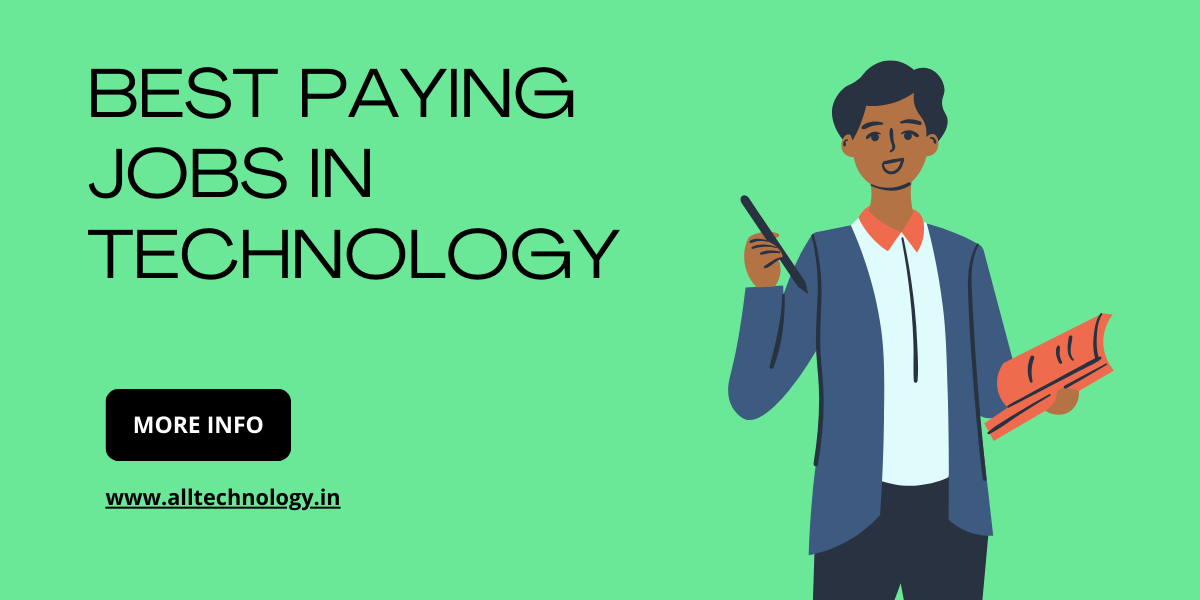Introduction
Hello Bloggers welcome alltechnology blog. In this blog you will learn. best paying jobs in technology. I will tell you best paying jobs in technology, and what should you do for it.

! The tech industry offers high-paying jobs with promising employment growth and excellent satisfaction ratings. Here are some of the top-paying tech jobs you might consider:
- Cloud Solutions Architect: These professionals design and manage cloud infrastructure for organizations.
Product Manager (Software): Product managers oversee the design and execution of software development projects. They play a crucial role in product strategy and development.
Cybersecurity Engineer: With the increasing importance of cybersecurity, these engineers protect systems and networks from cyber threats.
Software Engineer: Software engineers develop and maintain software applications. They work on everything from mobile apps to large-scale systems.
Blockchain Engineer: Blockchain engineers specialize in creating and maintaining blockchain-based systems. They work on decentralized applications and smart contracts.
Full-Stack Developer: Full-stack developers have expertise in both front-end and back-end development. They build complete web applications.
UX Designer: User experience (UX) designers focus on creating intuitive and user-friendly interfaces. They enhance the overall user experience of digital products.
Blockchain engineering involves designing, developing, and maintaining blockchain applications and systems. Let’s dive into the details:
- What Is a Blockchain?
- A blockchain is a type of database used to store and organize information.
- Unlike traditional databases with rows and columns, blockchains format information into clusters or blocks.
- Each block has a limited storage capacity and links to the preceding block using cryptography, creating a chain.
- This permanent record ensures the accuracy of sensitive information, such as transactions.
- Unlike centralized databases, blockchains are decentralized and not controlled by a central authority.
- Blockchain Development: Solving Problems and Creating Opportunities
- Blockchain development aims to leverage the unique features of blockchain technology.
- One innovative application is the smart contract:
- Smart contracts are agreements between parties stored on a blockchain.
- They execute automatically when both parties meet the agreed-upon terms.
- Think of them like parking meters: Insert payment, receive validation—no need for third-party involvement.
- Blockchain developers work on various aspects:
- Core Blockchain Developers:
- They design protocols, develop security patterns, and maintain the overall architecture of blockchain systems.
- Blockchain Software Developers:
- They build applications on existing blockchain platforms.
- Core Blockchain Developers:
- Responsibilities of a Blockchain Engineer:
- Developing Smart Contracts:
- Blockchain engineers create and implement smart contracts.
- These contracts execute automatically based on predefined conditions.
- Designing and Implementing Consensus Mechanisms:
- Consensus mechanisms ensure agreement among network participants.
- Blockchain engineers choose and implement the right consensus algorithm.
- Integrating Blockchain with Existing Systems:
- They connect blockchain technology to existing software and infrastructure.
- Ensuring Security and Scalability:
- Blockchain engineers maintain network security and scalability.
- Troubleshooting Issues:
- They address any problems that arise within the blockchain network.
- Developing Smart Contracts:
What programming languages are commonly used in blockchain development?
When it comes to blockchain development, several programming languages play a significant role. Let’s explore the most commonly used ones:
- Solidity:
- Solidity is the primary language for writing and deploying smart contracts on the Ethereum blockchain.
- It’s a statically typed curly-braces language with features familiar to developers from other languages.
C++:
- Known for its speed and efficiency, C++ is a powerful object-oriented language.
- It’s frequently used in Web3 development.
- Fun fact: Bitcoin was written in C++, although its creator, Bjarne Stroustrup, wasn’t thrilled about it!
- Go (Golang):
- Developed by Google, Go is gaining popularity in the blockchain space.
- Its simplicity, performance, and strong concurrency support make it a great choice for building decentralized applications (dApps).
- Rust:
- Rust is a newcomer in the blockchain world.
- Known for its memory safety and performance, it’s gaining traction for building secure and efficient smart contracts.
- Python:
- Python is a popular scripting language used in various domains, including blockchain.
- It’s often used for creating tools, libraries, and interacting with blockchain networks.
- Java:
- Although not as common as some other languages, Java is still relevant.
- It’s used for developing Android apps and has found its way into blockchain projects.
- JavaScript:
- As a widely used web development language, JavaScript is essential for building blockchain-related front-end interfaces and dApps.
Can you recommend any online courses for learning blockchain development?
If you’re interested in learning blockchain development, there are several excellent online courses and programs available. Here are some options:
- Coursera:
- Best Blockchain Courses Online with Certificates:
- This collection includes various courses and specializations related to blockchain.
- Notable options:
- Blockchain Basics (University at Buffalo):
- Gain foundational knowledge in blockchain, cryptography, and system security.
- Suitable for beginners and lasts 1 to 4 weeks.
- Bitcoin and Cryptocurrency Technologies (Princeton University):
- Explore blockchain and cryptography concepts.
- A mixed course lasting 1 to 3 months.
- Blockchain Revolution (INSEAD):
- Covers blockchain, finance, innovation, and more.
- Beginner specialization lasting 3 to 6 months.
- Web3 and Blockchain Fundamentals (INSEAD):
- A mixed course focusing on blockchain.
- Duration: 1 to 4 weeks.
- Blockchain Basics (University at Buffalo):
- Best Blockchain Courses Online with Certificates:
- edX:
- Blockchain Courses:
- edX offers free blockchain courses that cover essential concepts.
- Blockchain Courses:
Udacity:
- Blockchain Developer Nanodegree:
- Master blockchain fundamentals, smart contracts, and real-world applications.
